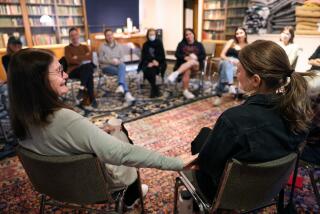FAMILY : Grieving Spouses, Children Find Empathy
Perched on a red beanbag chair, 6-year-old Benji Schwartz told the children sitting in a circle of an instance when he longed for his father, who had died from a brain aneurysm a year before.
“Sometimes I feel sad because I don’t have a father, and there’s no one to carry me to my mom’s bed while I’m sleeping,” Benji said quietly. “But when I go to the cemetery and visit him I feel happier . . . because I feel like I’m visiting him at home.”
The four other children in the group at Our House bereavement center in West Los Angeles, nodded, each one familiar with the feelings triggered by having to visit a parent in a cemetery.
Across the hall, Benji’s mom, Candie Schwartz, sat with a group of young widows, speaking of the emotional impact her husband’s death had on her, Benji and her 8-year-old daughter, Jaimie.
Benji had withdrawn and started hiding under furniture, she said. So a teacher referred the family to Our House, a nonprofit, non-sectarian agency that provides grief support groups for young families and children who have lost a parent.
Schwartz said Jaimie and Benji came out of their first peer support group thrilled to have met other children who had lost a parent and could understand their feelings.
Since they started attending the support groups, Schwartz said with a smile, “we don’t hide under tables any more.”
*
Primarily sustained by donations, Our House is believed to be the only Westside organization that offers bereavement support to children as young as age 3 who have lost a parent.
Our House founder Jo-Ann Lautman, a former member of the Cedars-Sinai Medical Center Hospice Team, organized a similar bereavement program at the Stephen S. Wise Temple in Los Angeles in 1986. Seven years later, through grants and donations, she opened Our House, which has served 150 people since then. Almost a dozen peer groups for children and adults are held twice a month.
In a low-rise office building on Sepulveda Boulevard, the center is a bright oasis of color, its rooms decorated to create a homey atmosphere. The adult groups meet in the largest room, nicknamed the living room, while the children meet in “the den”--filled with beanbag chairs, toys and art supplies.
Peer support groups work well for children, said Hilary Cohen, a social worker and executive director of Our House. Children of similar ages can share their feelings about the death of a parent and can give and receive support from one another, she said.
“One child can tell the other kids how they dealt with a similar loss. For example, they can tell each other how they handled their birthday without one of their parents. One of the group facilitators can talk about it, but we’re still adults. Their peers are more powerful,” Cohen said.
Art, play and music projects are used in the children’s groups to bring up and clarify the youngsters’ feelings.
One project from a recent session was a long piece of paper on which group facilitator Lori Cohen had drawn a large genie. Cohen, who is not related to Hilary Cohen, said she had asked each child in the group to write down three wishes that a magic genie could grant. A 6-year-old girl wrote in blue crayon: “1) I wish that my mom could come back to life; 2) I wish my brother was not a pest; 3) I wish no one in my family would ever die again.”
Although what the children say can be heart-rending, it is important that they talk about their emotions, Hilary Cohen said.
“It’s not depressing because it’s such a relief for these kids to come here and talk--about their parents or about anything,” she said. “Parents will say about their kids, ‘Oh, they won’t talk; they’re very shy.’ But the kids come here and we can’t get them quiet,” Cohen said.
*
Holidays, birthdays, and anniversaries can be especially hard.
September is a hard time of the year, 7-year-old Marissa Schaeffer told her group, because it is the month of her parents’ wedding anniversary.
“I have to help (my dad),” said Marissa, explaining that she tries to keep the wedding pictures away from her father because looking at them makes him cry. “And that makes me cry, and I don’t like to cry.” Marissa and her 5-year-old sister, Michelle, lost their mother almost three years ago to an aneurysm.
“I’m going into seventh grade, and my graduation (from elementary school) was really sad,” said Sol Rapoport, 11, whose father died of cancer two years ago. “I graduated with honors, including honors in math. And I practically wouldn’t have graduated if my dad hadn’t helped me with math. He was an engineer.”
“My dad was always proud of me, and now I found my dad isn’t there to be proud of me,” Sol said.
While the kids are meeting across the hall, the adults meet in groups specifically designed for young widows and widowers to discuss the wide range of feelings that arise from suddenly being a single parent.
“It started as a safe place to cry,” said Debbie Miller, a 42-year-old personnel manager, describing Our House. Miller, who lost her husband, Neil, to cancer, attends the young widow and widowers group every other week while her 9-year-old daughter, Julie, goes to a children’s group at Our House.
“It’s a home here,” Lautman said. “We’re not an institution. For these people, home was a place that once brought comfort and security--and then that was shattered. They can use Our House to rebuild themselves until their own homes are secure again.”
More to Read
Sign up for Essential California
The most important California stories and recommendations in your inbox every morning.
You may occasionally receive promotional content from the Los Angeles Times.










